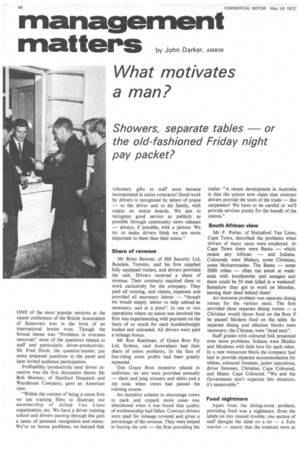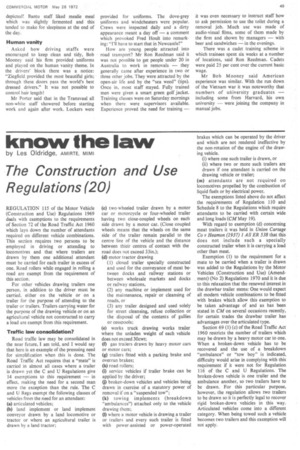management
Page 50

Page 51

If you've noticed an error in this article please click here to report it so we can fix it.
matters by John Darker AMB M
What motivates a man?
Showers, separate tables or the old-fashioned Friday night pay packet?
ONE of the most popular sessions at the recent conference of the British Association of Removers was in the form of an international brains trust. Though the formal theme was "Problems in overseas removals" most of the questions related to staff and particularly driver-productivity. Mr Fred Hoult, the question-master, put some prepared questions to the panel and later invited audience participation.
Profitability /productivity /and driver incentive was the first discussion theme. Mr Bob Mooney, of Hartford Despatch and Warehouse Company, gave an American view.
"Within the context of being a union firm we use training films to illustrate our membership of Allied Van Lines organization, etc. We have a driver training school and drivers passing through this gain a sense of personal recognition and status. We've no bonus problems; we learned that voluntary gifts to staff soon became incorporated in union contracts! Good work by drivers is recognized by letters of praise — to the driver and to his family, with copies on notice boards. We aim to recognize good service as publicly as possible through community news releases — always, if possible, with a picture. We try to make drivers 'think we are more important to them than their union."
Share of revenue
Mr Brian Bennett, of Hill Security Ltd, Rexdale, Toronto, said his firm supplied fully equipped trailers, and drivers provided the unit. Drivers received a share of revenue. Their contracts required them to work exclusively for the company. They paid all running, and claims, expenses and provided all necessary labour — "though we would supply labour to help unload as necessary, and at a price". In one or two operations where no union was involved the firm was experimenting with payment on the basis of so much for each hundredweight loaded and unloaded. All drivers were paid a mileage bonus.
Mr Ron Reedman, of Grace Bros Pty Ltd, Sydney, said Australians had their share of union problems. In the face of fast-rising costs profits had been greatly squeezed.
One Grace Bros incentive related to uniforms; six sets were provided annually — short and long trousers and shirts and a zip tunic when crews had passed the training course.
An incentive scheme to encourage crews to pack and unpack more cases was abandoned when it was found that quality of workmanship had fallen. Contract drivers were paid for mileage covered and given a percentage of the revenue. They were helped in buying the unit — the firm providing the trailer. "A recent development in Australia is that the unions now claim that contract drivers provide the tools of the trade — like carpenters! We have to be careful or we'll provide services purely for the benefit of the unions."
South African view
Mr F. Porter, of Stuttaford Van Lines, Cape Town, described the problems when drivers of many races were employed. At Cape Town there were Bantu — which meant any African — and Indians. Coloureds were Malays, some Christian, some Mohammedan. The Bantu — some 2000 tribes — often ran amok at weekends with knobkerries and assegais and there could be 50 men killed in a weekend! Somehow they got to work on Monday, leaving their dead behind them!
An immense problem was separate dining rooms for the various sects. The firm provided three separate dining rooms — a Christian would throw food on the floor if he passed Moslem food on the table. So separate dining and ablution blocks were necessary; the Chinese, were "dead easy".
Staff grades with coloured folk presented even more problems. Indians were Hindus and Moslems with little love for each other. In a new restaurant block the company had had to provide separate accommodation for whites, coloured foremen, junior executives, driver foremen, Christian Cape Coloured, and Malay Cape Coloured. "We and the Government don't organize this situation; it's immovable."
Food nightmare
Apart from the dining-room problem, providing food was a nightmare. Even the labels on tins caused trouble; one section of staff thought the label on a tin a Zulu warrior — meant that the contents were as
depicted! Bantu staff liked mealie meal which was slightly fermented and this tended to make for sleepiness at the end of the day.
Human vanity • Asked how driving staffs were encouraged to keep clean and tidy, Bob Mooney said his firm provided, uniforms and played on the human vanity theme. In the drivers' block there was a notice: "Ziegfield provided the most beautiful girls; through these doors pass the world's best dressed drivers." It was not possible to control hair length!
Mr Porter said that in the Transvaal all non-white staff showered before starting work and again after work. Lockers were provided for uniforms. The dove-grey uniforms and windcheaters were popular. Crews were inspected daily and a dirty appearance meant a day off — a comment which provoked Fred Houk into remarking: "Ill have to start that in Newcastle!"
How are young people attracted into road transport? Mr Ron Reedman said it was not possible to get people under 20 in Australia to work in removals — they generally came after experience in two or three other jobs. They were attracted by the open-air life and by the "sea weed" (tips). Once in, most staff stayed. Fully trained men were given a smart green golf jacket. Training classes were on Saturday mornings when there were supervisors available. Experience proved the need for training — it was even necessary to instruct staff how to ask permission to use the toilet during a removal job. Much use was made of audio-visual films, some of them made by the firm and shown by managers — with beer and sandwiches — in the evenings.
There was a cadet training scheme in which trainees spent six weeks at a number of locations, said Ron Reedman. Cadets were paid 25 per cent over the current basic wage.
Mr Bob Mooney said American experience was similar. With the run down of the Vietnam war it was noteworthy that numbers of university graduates — including some from Harvard, his own university — were joining the company in manual jobs.




































































































